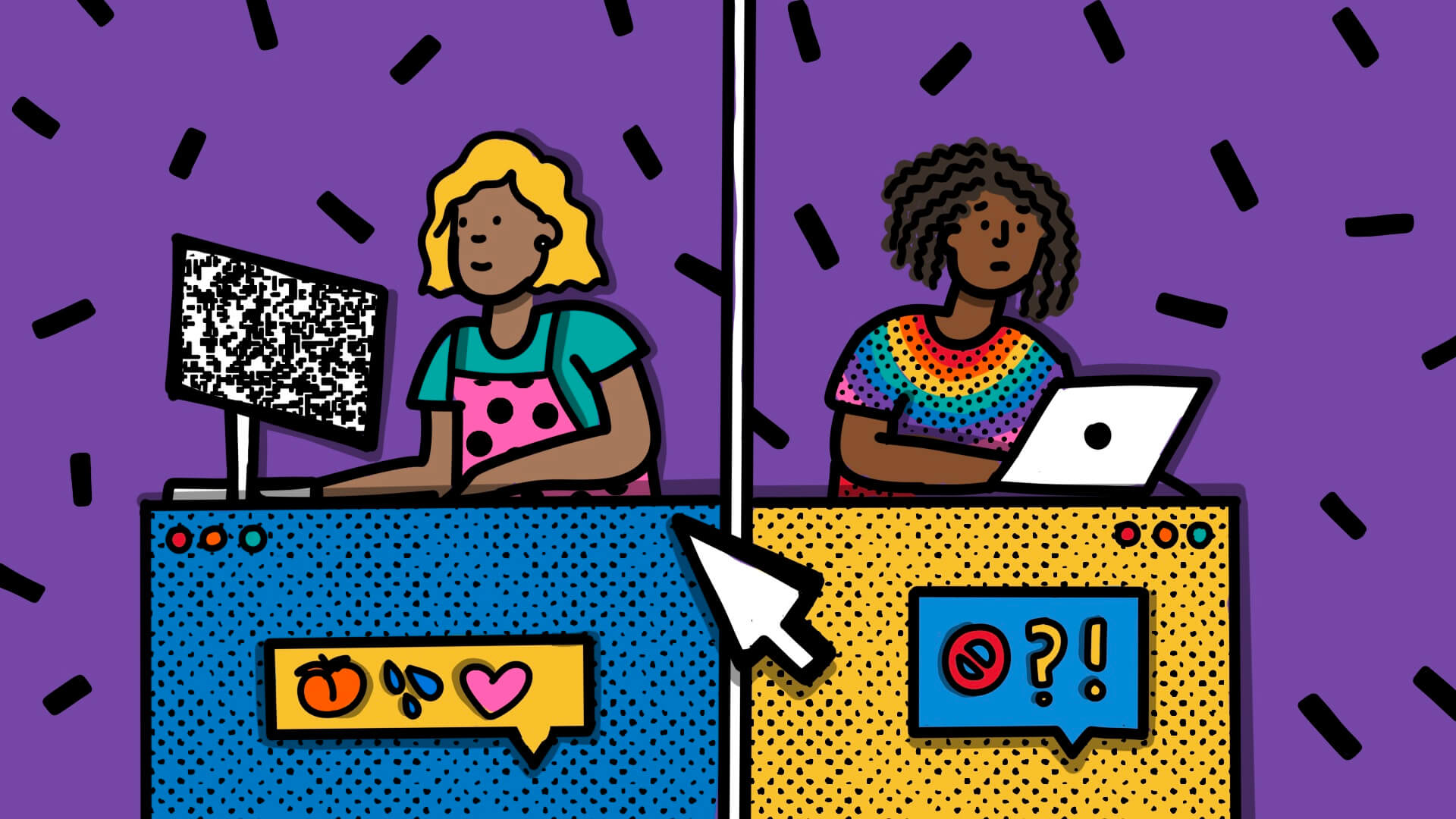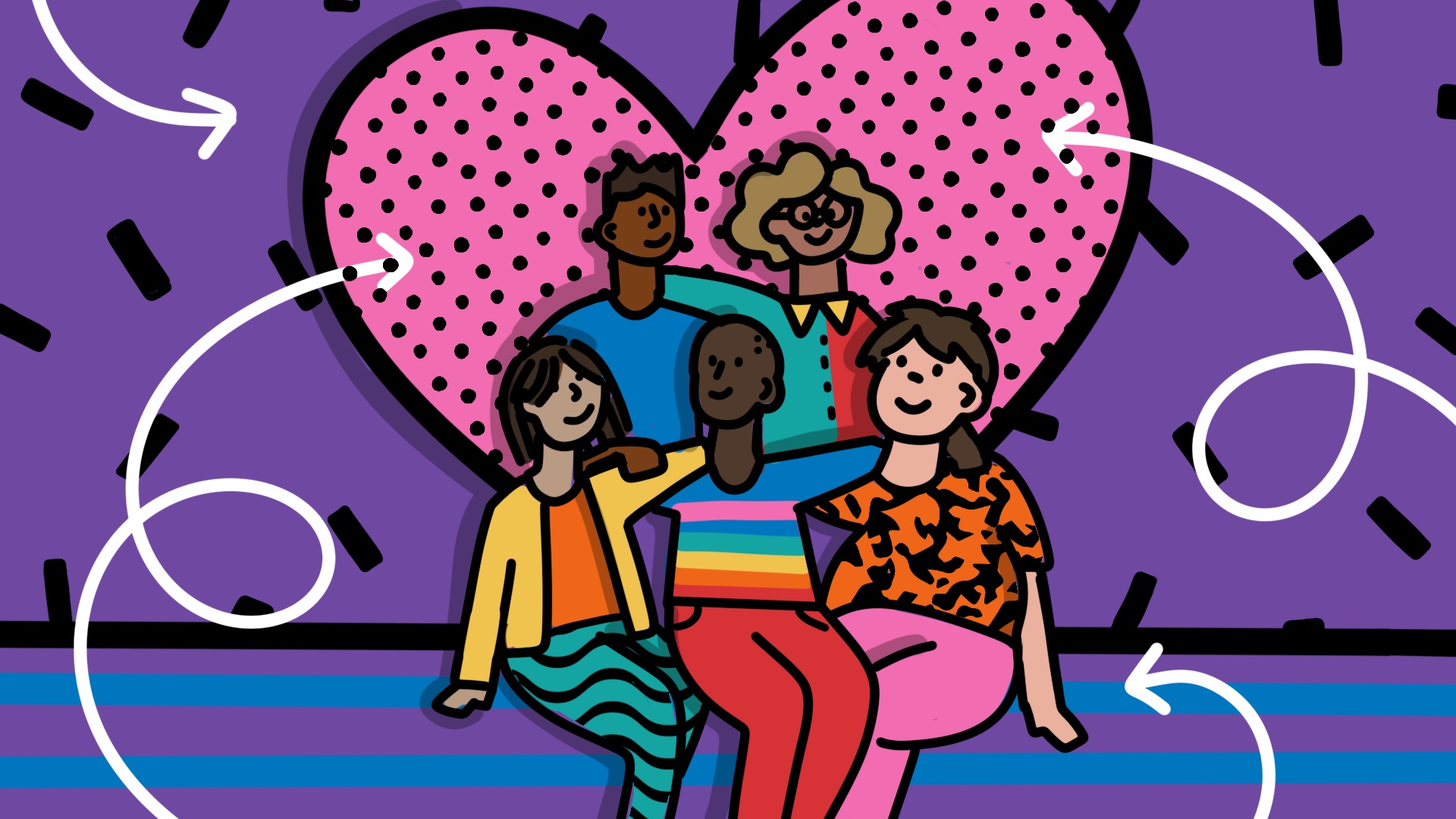
Illustration by Soofiya
Queeries: How do I get over a friendship breakup?
The nuclear family is a cis-het scam which leaves queer people particularly vulnerable after friendship breakups says our Fagony Aunt. Take space and sit with your feelings.
Aisha Mirza
17 Feb 2021
Dear Fagony Aunt,
We met on the dance floor six years back, solo dancing by the speakers. From party friends to dinner friends to “I am scared of this world and I have never had a best friend” friends, before we knew it, we found home in each other and I felt a strange new type of belonging. We had so many rituals, collecting friends on the dancefloor, buying shots, halloumi wraps from that place in Ostkreuz, video call SOS for breakups, makeups and everything in between. We could depend on each other and it was joyous.
Then the pandemic hit and it all started changing. I’m not sure where it started but I know it ended badly. I broke into a million pieces and was lying on my bed crying for three months straight. We couldn’t understand each other anymore, couldn’t see or hear each other anymore. Nothing made sense. Maybe our language changed, maybe our love changed, maybe we didn’t change enough together, but it’s gone and all I know is I never want a best friend again.
What happens post friendship break up? Do we become strangers? There was so much intent with that friendship, so much trust and a whole lot of care. Is the only option to just get over it and move on?
Signed Sad Slug
Dear Sad Slug,
A friend recently reminded me that to love is brave. Regardless of which type of love you’ve opened yourself up to experiencing, be it the love of a child, romantic love, pet love, friendship, montages of Sarah Paulson and Holland Taylor, or something in-between or undefined. The stakes are high when we love because in doing so we are opening ourselves up to the possibility of inscrutable loss. You are in tremendous pain, and you are also so brave. I want you to remember that.
The cis-het normative world we inhabit vigorously promotes a creepy scam that the nuclear family can and should be the source of all our needs. No-one knows how wrong this is like queer, transgender and other marginalised people who have to look to friendships to cultivate the safety, companionship, support and kindness that we often can’t find elsewhere. These are people we’ve shared group chats and houses with, who have danced all night with us and held us as we cry. People we’ve binge-watched Love Island with and been taken to hospital by. They’re people we might dream of co-parenting and growing old with. When we lose these connections it fucking huuurts, and the sorrow, anger and confusion that arises from that loss is so valid, for as long as we feel it.
Compared to romantic breakups, there is little established language or protocol for loss of friendship, despite most people having lived through the unique pain of it. Friendship breakups can be some of the most shattering experiences we endure and we should be able to mourn them like any other huge loss if that’s how they feel. Hierarchies of pain and love are sus. Friendship, compared to romantic love, has a particular unspoken forever expectation to it. Boys come and go, but friends last forever, they say, except sometimes they don’t. What then?
“Boys come and go, but friends last forever, they say, except sometimes they don’t. What then?”
Something helpful to realise and hold onto is that when a friendship doesn’t work out in the way you’d imagined or for the duration you’d hoped for, that’s not an automatic indication that you or your friend are flawed or bad people. There can be shame attached with losing friends, particularly if you share lots of mutuals or are part of an idealised community, like queer ones of colour, where support and love can be perceived to flow abundantly all the time. Fractures in friendships actually make so much sense, particularly in these communities, where so many of us are struggling to get our personal needs met. Try to let go of the idea that it’s a failure to have a relationship take a different road from the one you expected. Not everything needs to be judged and not every friendship is, can or should be forever.
The question of what happens post friend break-up and how to sift through and sit with the feelings of violation, loss, betrayal and mistrust we’re left with is such an important one! I’m glad you cried in bed for three months. I’m proud you took that time to honour your grief. Breakups are never easy, but this is a Particularly Rough time to be going through anything that challenges your sense of love and safety. You must be extra kind to yourself, listen to the waves of emotion as they come, and try not to minimise how hard it all feels.
Due to the lack of understanding or open discourse around it, friend breakups can also feel very isolating in comparison to a romantic breakup which is widely understood to suck and is inherently viewed as an invitation for care from those around you. A serious disagreement or breakdown in communication with a friend can be seen more as your individual problem, and if you share friends they may actively not want to get involved.
This is when it can be really important to create your own protocols, rituals and boundaries for your healing. Listen to sad bad bitch music, write letters to them and burn them, spend time nurturing your other relationships and finding replacements for the things you relied on them for. Cry, scream and find safe spaces to vent. Mute or block them and things and people that remind you of them if that will help you get through a day without being reminded. It doesn’t have to be forever, but if it creates that safe bubble within which to build yourself again, it’ll be worth it. Have conversations with friends about what you’re going through and what they can do to support you. Time will do the rest.
“Friend breakups can also feel very isolating in comparison to a romantic breakup which is widely understood to suck”
I think taking space is a really underrated tool for healing after any sort of break up. Real space. If possible, negotiated, no speaking space. In my experience, the queers hate it, preferring instead to try and rush to a conclusion or process their way into oblivion or point of closure. This is understandable. We often don’t have the luxury of ‘just see what happens’, the trust in time as a healer or the physical space to spread out and simply do our own thing, as we all rely on so many of the same resources. We’re used to helping our close friends move through so much heartache in this world, why not this too?
It’s a huge drag but healing from this sort of fracture takes as long as it takes. Things are rarely tied up in a neat bow in situations like this, no matter how deeply we crave that. People get hurt, people take advantage of and manipulate others, people say things they don’t or do mean and sometimes we can even be left confused about what even actually happened. No-one wants to just sit with these ragged rock-edges of emotion, but sometimes that’s actually the kindest thing you can do for yourself. Rather than thrashing around trying to fix something that feels broken, it can be helpful to really try and focus on what you need to soothe yourself and move forward or whatever direction you’re trying to move in. We often look for closure in people or places that can’t actually give it to us, but with that space can come clarity, healing and the peace of centring yourself.
When you say you don’t want a best friend again, I’m hearing that you don’t want to be hurt like this again, and I hope you won’t be. It’s so natural for self-confidence, openness and trust to be deeply wounded after an experience like this, but you are worthy of love and not only will it get easier to make new friends the more you have space from the wound, but this experience will help you grow and learn about what you desire and need in a friendship, be it this one or future ones. Don’t forget to pay attention to that part!
I admire your resolve, that your ex-friend should not be so disposable. Of course, a friendship break up or break down does not have to signal the end of you in each other’s lives forever. In fact, it may not feel like it so soon, but you do have so many options here! The space apart from each other, harrowing though it is, gives you the chance to reflect on what happened, what roles you played in each other’s lives, what you want and need from them, what you may need to be accountable for yourself, what communication and boundaries might look like in a new relationship between you, how you want to approach it, and what the best next steps might be.
“A friendship break up or break down does not have to signal the end of you in each other’s lives forever”
If the friendship did not become a dangerous or abusive dynamic, and you have not been asked to never contact them again, there is no reason why after some good, good time you can’t reach out respectfully and with no expectations or motives. If any of the many white friends I have broken up with over the years for their latent racism, but who I once loved, reached out to me now, years later, to apologise or show that they have in some way grown to understand race and privilege dynamics, I would probably consider reconnection, because I know that’s what I need to feel safe in those friendships. Millennia of white supremacy would suggest that’s never going to happen though, and so with an everlasting flower of sorrow in my shrivelled heart, I move.
Jeanette Winterson’s 1992 novel Written on the Body opens with the line, “Why is the measure of love loss?” It has danced on my brain since I first read it ten years ago in an email from a friend that I am still friends with. Must we experience crushing loss every time we love? What is one without the other? How will I keep loving? Alongside everything you have felt and will feel is love. There are gems amongst the pain, and after some time, in moments, you may be able to feel fondly towards all that you experienced, regardless of where you both are now. As much as the future is uncertain, the past is sweet, and that’s beautiful.
If there are any queeries you would like answered in a future column, email them to niellah@gal-dem.com with the subject line “Queeries”. They will be anonymised.








